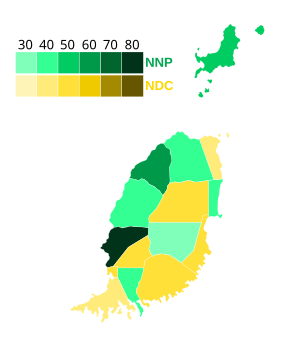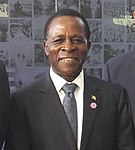| |||||||||||||||||||||||||||||||
All 15 seats in the House of Representatives 8 seats needed for a majority | |||||||||||||||||||||||||||||||
|---|---|---|---|---|---|---|---|---|---|---|---|---|---|---|---|---|---|---|---|---|---|---|---|---|---|---|---|---|---|---|---|
| Turnout | 57.72% | ||||||||||||||||||||||||||||||
| |||||||||||||||||||||||||||||||
 Winning party by constituency | |||||||||||||||||||||||||||||||
| |||||||||||||||||||||||||||||||
 |
|---|
| Administrative divisions (parishes) |
General elections were held in Grenada on 27 November 2003. [1] The New National Party government of Prime Minister Keith Mitchell won a third consecutive term with a reduced majority. Voter turnout was 57.7%. [2]


